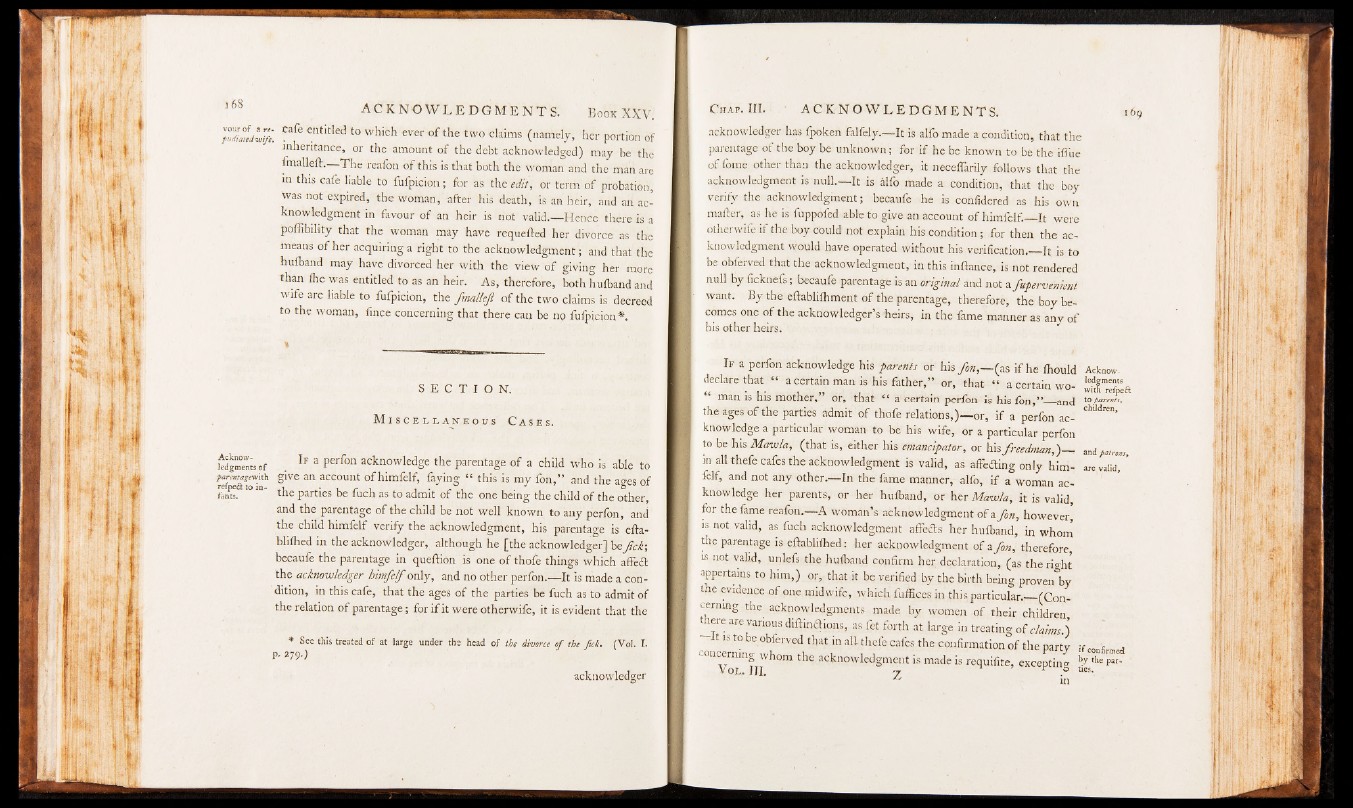
vour o f a re-
pudiated'wifie,
Acknowledgments
o f
parentagewith
refped to infants.
cafe entitled to which ever of the two claims (namely, her portion of
inheritance, or the amount of the debt acknowledged) may be the
fmalleft. The reafon of this is that both the woman and the man are
in this cafe liable to fufpicion; for as the edit, or term of probation,
was not expired, the woman, after his death, is an heir, and an acknowledgment
in favour of an heir is not valid.—Hence there is a
pofiibility that the woman may have requefted her divorce as the
means of her acquiring a right to the acknowledgment; and that the
hufband may have divorced her with the view of giving her more
than Ihe was entitled to as an heir. As, therefore, both hufband and
wife are liable to fufpicion, the fmallejl of the two claims is decreed
to the woman, fince concerning that there can be no fufpicion*.
S E C T I O N .
M i s c e l l a n e o u s C a s e s .
If a perfon acknowledge the parentage of a child who is able to
give an account of himfelf, laying <( this is my ioii,1' and the ages of
the parties be fuch as to admit of the one being the child of the other,
and the parentage of the child be not well known to any perfon, and
the child himfelf verify the afcknowledgment, his parentage is efta-
blilhed in the acknowledger, although he [the acknowledger] befick\
becaufe the parentage in queftion is one of thole things which affeft
the acknowledger himfelf only, and no other perfon.—It is made a condition,
in this cafe, that the ages of the parties be fuch as to admit of
the relation of parentage; for if it were otherwife, it is evident that the
* See this treated of at large under the head of the divorce of the ftck. (Vol. I.
p. 279.)
acknowledger
acknowledger h,as fpoken falfely.— It is alfo made a condition, that the
parentage of the boy be unknown ; for if he be known to be the ifiue
of fome other than the acknowledger, it necefîârily follows that the
acknowledgment is null— It is àlfo made a condition, that the boy
verify the acknowledgment; becaufe he is ;confidered as his own
mailer, as he is fuppofed able to give an account of himfelf.— It were
otherwife if the boy could not explain his condition ; for then the acknowledgment
would have operated without his verification._It is to
be obferved that the acknowledgment, in this inltance, is not rendered
null by ficknefs ; becaufe parentage is an original and not a fupervenient
want. By the ellablifhment of the parentage, therefore, the boy becomes
one of the acknowledger’s heirs, in the fame manner as any of
his other heirs.
I f a perfon acknowledge his parents or his f on,— (ps if he Ihould Acknow-
declare that “ a certain man is his father,” or, that “ a certain wo- ledgme"ts„
man is his mother, or, that 66 3. certain perfon is his fon,,,—~and ^QPar^tsy
the âgés of the parties admit of thofe relations,)— or, if a perfon ac- ChlUren’
knowledges particular woman to be his wife, or a particular perfon
to be his Mawla, (that is, either his emancipator, or his freedman,)— and patnm,
in all thefe cafes the acknowledgment is valid, as affefting only him- are valid, *
felf, and not any other.— In the fame manner, alfo, if a woman acknowledge
her parents, or her hufband, or her Mawla, it is valid,
for the famé reafon.— A woman’s acknowledgment of a fon, however,
is not valid, as fuch acknowledgment affe&s her hufband, in whom
the parentage is eftablifhed : her acknowledgment of a fon, therefore,
is not valid, unlefs the hufband confirm her declaration, (as the rio-ht
appertains to him,) or, that it be verified by the birth being provenby
t- e evidence of one midwife, which fuffices in this particular._(Concerning
the acknowledgments, made by women of their children
there are various diflindions, as fet forth at large in treating of claims )
MRfl Cafes. Ü H I of ‘ he party MBf
c whom the acknowledgment is made is requifite, except in o- by the i)ar-
V o l . III. 7 r ties-.
in